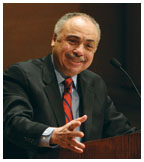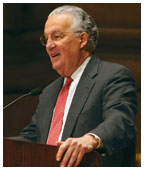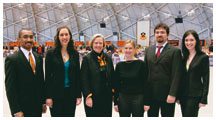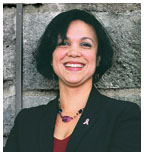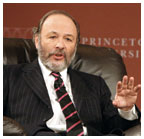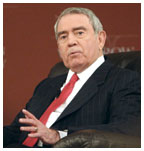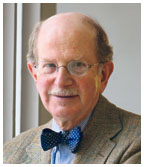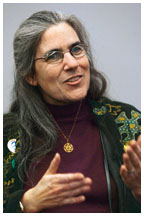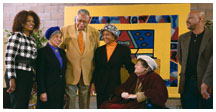
|
March 21, 2007: Notebook
Top alumni honors go to Sarbanes
’54, Coles *66
Alumni Day draws 1,200 to campus
Students awarded University’s highest honors
The race for president: Three views
Melissa Harris-Lacewell, on likely scenarios for the campaign
Katz celebrated as the ‘Medici of legal history’
Forum airs the role of race in Princeton admissions
Julius Coles *66
Paul Sarbanes ’54 (Photos: Denise Applewhite/Office of Communications) |
Top
alumni honors go to Sarbanes ’54, Coles *66
Alumni Day draws 1,200 to campus
In recalling their student days, this year’s Alumni Day honorees remembered how they benefited from Princeton’s efforts to diversify its student body.
Former Sen. Paul Sarbanes ’54, the Woodrow Wilson Award recipient, said that the prospect of an Ivy League education was “far beyond the horizon” of his family’s hopes. But a University initiative to attract graduates of public high schools, coupled with a loan and a campus job delivering newspapers, brought the son of Greek immigrants to Princeton and enabled him to pursue a 40-year career as an elected official.
Africare president Julius Coles *66, the James Madison Medal honoree, was one of a handful of African-American graduate students at Princeton in the early 1960s. He grew up in Atlanta, attended Morehouse College, and never had studied alongside people of other races before coming to the Woodrow Wilson School. The experience was not without difficulties, Coles said, but his studies took him “to another level” and gave him the confidence to believe he could compete with anyone as he embarked on a career in service abroad.
Coles and Sarbanes, surrounded by their extended families and classmates, joined about 1,200 Princetonians and family members Feb. 24 for a day of social events and intellectual gatherings that President Tilghman called “a time to remember what this University is really about.”
In addition to attending lectures by Coles and Sarbanes, alumni listened to faculty talks on topics ranging from health care in the United States to neuroscience. Dean of the College Nancy Weiss Malkiel and Vice President for Campus Life Janet Smith Dickerson discussed the four-year residential colleges, set to open in the fall, and fielded questions about University policies for preventing and curbing alcohol abuse.
Performing chemistry experiments popularized by the late professor Hubert Alyea ’24, the inspiration for the Disney movie The Absent-Minded Professor, lecture demonstrator Kathryn Wagner fascinated alumni and their children with her examples of “household chemistry.” The program con-cluded with the “Old Nassau Clock Reaction,” in which students had to combine clear liquids to turn orange and then black at the appropriate moments while singing “The Orange and the Black.”
At the traditional luncheon gathering in Jadwin Gym, President Tilghman and alumni leaders presented awards to undergraduates, graduate students, and alumni. After lunch, many alumni visitors gathered in the University Chapel for the annual Service of Remembrance, honoring alumni, students, faculty, and staff who died in 2006. In the late afternoon, Sarbanes and Coles joined professors Gary Bass and Jennifer Widner for a discussion in Richardson Auditorium of the crisis in Darfur. Offering his views from the audience was former Sen. William Frist ’74, just returned from a trip to Darfur as a surgeon. The day ended with a dinner at the Graduate College honoring Coles, with warm toasts offered by his brother, Cleo; a Wilson School classmate, Sheldon Schreiberg *66; Dean Anne-Marie Slaughter ’80; and President Tilghman.
Coles opened the day at Richardson Hall with a lecture about Africa, the focus of his work for more than four decades. He first traveled to Africa as an undergraduate and later returned there to work, first for the U.S. Agency for International Development and more recently for Africare, a nonprofit aid organization. The continent is undoubtedly poor in both absolute and relative terms, Coles said, and plagued by malnourishment, drought, civil unrest, corruption, and the legacies of some of the world’s most brutal dictators. In addition, AIDS has ravaged the population, leaving 12 million children without parents. “Nothing has been a greater challenge to peace and stability in Africa than the AIDS pandemic,” Coles said.
But at the same time, Coles said that Africa, with its young labor pool, has potential for growth and prosperity, vast mineral wealth, encouraging economic growth rates, and several strengthening democracies. Continuing to increase U.S. aid could help Africa to move forward economically and address the AIDS pandemic, he said. Quoting the new Liberian president, Ellen Johnson-Sirleaf, Coles called the continent “open for business — but not business as usual.”
Sarbanes, who recently left the U.S. Senate after five terms in office, reflected on his government career, which began in the Maryland House of Delegates. He spoke about one of his role models, Benjamin Franklin, who demonstrated how diplomacy could advance America’s interests. “Today, our public discourse is regrettably too often dominated by the loudest, harshest, and most strident voices,” Sarbanes said. “The standards of civility that Franklin set are more important than ever.”
In recounting key moments in his career, from the impeachment proceedings against President Richard M. Nixon to the Sarbanes-Oxley legislation that was passed in response to major corporate and accounting scandals, Sarbanes stressed the importance of thoughtful deliberation, even when the temptation may be to “strike while the iron is hot.” The work of Capitol Hill has broad consequences, Sarbanes said, because “an important dimension of the quality of life is to be well-governed.”
After the lecture, college roommate David Rosenberg ’54 presented
Sarbanes with a silver platter from the Class of 1954, with an inscription
that lauded the former senator’s “intellect, integrity, and
devotion.” ![]()
By B.T.

S. Barksdale Penick Jr. ’25 Award (for local Schools Committee work) The Princeton Club of Southern Arizona, the Princeton Club of Savannah, and the Princeton Club of Korea.
Class of 1926 Trophy (for raising the largest amount for Annual Giving in a given year) The Class of 1981 ($5,449,081).
Jerry Horton Award (for efforts to increase Annual Giving amounts and participation) The Annual Giving Committee of Greenwich, Conn.
Harold H. Helm Award (for exemplary and sustained service to
Annual Giving) James A. Henderson ’56 of Columbus, Ind.,
former chairman of the executive committee of the Board of Trustees and
former head of the Campaign for Princeton, 1981–1986.
![]()

President Tilghman was joined at the Alumni Day luncheon in Jadwin Gym by recipients of the University’s highest honors for students. From left are Pyne Prize winners Lester Mackey ’07 and Alisha Holland ’07; Tilghman; and Jacobus Fellowship winners Sarah Pourciau ’98, Egemen Kolemen, and Carmen Drahl. The fourth Jacobus Fellowship recipient, William Slauter, was unable to attend the event. (Denise Applewhite/Office of Communications) |
Students awarded University’s highest honors
The Moses Taylor Pyne Honor Prize (the highest general distinction awarded to an undergraduate)
Lester Mackey ’07, computer science
Mackey, of
Wheatley Heights, N.Y., is the first Princeton student to be named outstanding
male undergraduate by the Computing Research Association, the highest
honor a North American college student can receive in computer science.
He chairs the Undergraduate Research Symposium, worked on a project to
develop technology to assist victims of aphasia, sang in the Kindred Spirit
a cappella group, and was an editor of the diversity journal Prism.
Alisha Holland ’07, Woodrow Wilson School
Holland, of Amherst, Mass., a co-founder of the Latin American Studies
Student Organization, traveled to El Salvador and Guatemala to research
her senior thesis on political and legal responses to gang-related violence;
her findings were presented to the Organization of American States. Holland
also helped start Princeton Against Protectionism, a group dedicated to
promoting free trade in food, and helped persuade Dining Services and
the eating clubs to buy more food from poor nations. She also has led
the campus figure skating and flamenco dance groups.
The Porter Ogden Jacobus Fellowship (the highest honorific fellowship awarded by the Graduate School)
Carmen Drahl, chemistry
Drahl’s research has focused on synthesizing a molecule found deep
in the Sea of Japan that could provide a new way to fight antibiotic-resistant
bacteria.
Egemen Kolemen, mechanical and aerospace engineering
To search for new planets outside the solar system, Kolemen is working
on a proposal to equip multiple spacecraft with devices that would be
equivalent to one large telescope.
Sarah Pourciau ’98, German
Focusing on “the search for truth in language,” Pourciau is
studying the etymological approach to words, and the role it played in
modes of expression, at the turn of the 20th century.
William Slauter, history
Slauter is studying how political and military information moved among
America, France, and Britain during the Revolutionary War.
![]()

 The
race for president: Three views
The
race for president: Three views
With the 2008 presidential campaign heating up, there’s been no shortage of political analysis at Princeton. In the question-and-answer period of an Alumni Day lecture, associate professor Melissa Harris-Lacewell, who is frequently quoted by journalists on political issues, was asked how she sees the race unfolding. Three days later, broadcast journalist Dan Rather, the host of Dan Rather Reports, and Time magazine columnist Joe Klein took part in “Race to the White House: Talking Politics at Princeton,” a program televised live from Richardson Auditorium. Following are excerpts from their comments:
(Courtesy Melissa Harris-Lacewell) |
Melissa Harris-Lacewell, on likely scenarios for the campaign
Hillary Clinton can’t win. She can’t win for two reasons. She’s running way too far out in front, which means that ... in the early primaries, she’s going to disappoint. Unless she wins every single vote, the news coverage is going to have to be, “Wow, Hillary Clinton underperforms in New Hampshire, Iowa.”
So part of it is, she’s going to have difficulty winning the Democratic nomination because she’s running so far out in front.
However, because the Democratic Party is the party that gave us people like Dukakis, and Mondale, and, God help us, John Kerry, it is completely possible that in a sort of psychotic delusion that Hillary Clinton could win the U.S. presidency, in fact the Democrats will actually nominate Hillary Clinton. If they do, Rudy Giuliani will beat Hillary Clinton in the street like a small child. He’ll come straight up the middle and destroy her. So, Hillary Clinton is unlikely to win the Democratic nomination, and if she does, it’s completely impossible for her to win the American presidency ...
Barack Obama, on the other hand, absolutely will not win the Democratic nomination for the presidency at the top, but is highly likely to be a great running mate for John Edwards, who is actually running in the best possible position because very early, he’s running third. So when all the very early presidential language is going to be Hillary Clinton underperformed, the big story is going to be: “But John Edwards, my God, three people voted for him! He way overperformed” — and so the money will shift. The other thing is that if the Democrats actually manage to nominate the white-boy Southern populist with the wife who had breast cancer and who had fertility treatments, and therefore is chubby and has gorgeous little blond children, and is married to a good-looking man, every white woman in America will vote for her.
An [Edwards/Obama] ticket cannot be beaten by any ticket that the Republicans can currently put up, unless they come up with someone else. [Harris-Lacewell continued that the surest way for any Democrat to win would be for the GOP to be “shamed” into running a minority or woman candidate.] At which point the Republican Party might be shamed into running Condi Rice. And if Condi runs, as a black woman, then Hillary might actually be able to win, because Condi is so linked with the war in Iraq…
So, that’s the election.
(Photo by Hyunseok Shim ’08) |
Joe Klein, on the issue of character ...
The presidency is unlike any other office. It’s the most intimate office we have. The president lives in your kitchen, lives in your TV room, lives in your bedroom, and we want to get a sense of who this person is. ... What I’m looking for is the quality of the mind, what I’m looking for is the sensibility. ... In 2008, we will have had 20 years of Bushes and Clintons as president of the United States, and I think the American people think that this office is too precious to take it back and forth between these two particularly weird families.
... and on the Republican Party
They are mystified by this election. Usually the Republicans are very orderly and democratic, but this nomination process is a barroom brawl.
(istockphoto) |
Dan Rather, on money and politics ...
There may be few questions more important than that of whether we are still a nation of, by, and for the people, or whether we are becoming a nation of, by, and for people with money — the kind of money that could make some voices more equal, or much more equal, than others. ... This process of electing a president is not only starting earlier than ever this year, it is also expected to involve more money than ever before. We are talking about probably a $2 billion election campaign.
... and on a moderate candidate
I don’t think the parties are ready to nominate a moderate, by
most people’s definition of a moderate.
![]()

A faculty committee has proposed adding an extra week to the spring and fall terms, saying that a 12-week teaching semester is “simply too short.”
A report distributed to faculty and students by Nancy Malkiel, dean of the college, said that trustees and parents repeatedly ask “why Princeton has fewer teaching weeks than our closest peers.” A 12-week semester “puts too much pressure on faculty as well as students,” the report said.
The report compared Princeton’s 24 teaching weeks with 25 at Brown; 26 at Harvard and Yale; 27 at Columbia, MIT, and Penn; and 28 at Cornell and Duke. Dartmouth and Stanford, both on the quarter system, also have 28 teaching weeks.
The Committee on the Course of Study offered two alternative calendars to accommodate the additional teaching time. Each would include 13 full teaching weeks per term; change the start of fall term from Thursday to the Monday after Labor Day; provide a full week off at Thanksgiving; overlap reading period and final exams; and shorten intersession from eight to five days.
The primary difference between the two proposals is that one would retain a full week off for fall break and would have a two-week Christmas vacation; the other would eliminate fall break and would have a three-week Christmas vacation.
The schedule for Reunions and Commencement would not change under either plan.
The calendar was last changed in 1995–96, when the University moved the first day of fall classes to Thursday and shortened the spring semester’s exam and reading periods.
The faculty, which has the final say over changes to the academic calendar,
was scheduled to discuss the proposals March 5. The changes would not
take effect before the 2011–2012 academic year. ![]()
By W.R.O.

(Frank Wojciechowski) |
Katz celebrated as the ‘Medici of legal history’
As Professor Stanley Katz stood before an applauding audience of some 300 colleagues and students in Robertson Hall last month, he reflected wryly on the conclusion of a two-day conference in his honor.
“This has been a wonderful and entirely bizarre experience,” said Katz, a lecturer with the rank of professor at the Woodrow Wilson School since 1978. It was, he said, as if he had “just attended my own memorial.”
Katz was honored as an influential teacher and a pioneer in the field of legal history — an intellectual force who has shaped his field with energy, passion, and well-placed administrative muscle. One speaker termed him “the Lorenzo de Medici of legal history.”
In the public sphere, Katz is a forthright advocate of the integrity of scholarship. As president of the American Council of Learned Societies from 1986 to 1997, he challenged the growing emphasis on research universities as economic engines rather than houses of culture and ideas, asserting that “the modern university is in tension with the liberal arts institution within.”
The conference, sponsored by the Program in Law and Public Affairs and planned by Katz’s colleagues and students around the time of his 70th birthday, included readings, slide-show reminiscences, and sessions on themes that have given focus to Katz’s work, including legal history, philanthropy, and the mission of higher education.
University Provost Chris Eisgruber ’83 described his experience as a law student who progressively moved to different schools that Katz had just left, at each of which “Stan was a figure to be conjured with.” Katz became “like King Arthur to me,” Eisgruber said. “Legendary, talked about by everyone, inspiring — but was he real?”
The talks often returned to Katz’s role as an important “producer of producers,” a teacher of other leading scholars. “I think that teaching is about preparing citizens, about creating the infrastructure for democracy,” Katz said. He said he values Princeton because “Princeton is famous for taking undergraduates seriously.”
Katz drew applause when he said he has no plans to retire. “People
retire to have fun,” he said. “This is my 50th year of teaching,
and I had more fun this year than I did in my first year.” ![]()
By Elyse Graham ’07

 |
(Steven Veach)
Beak in review
Competition for food between different species can cause significant changes in “resource-exploiting traits,” such as beak size, according to the latest study of Galápagos finches by evolutionary biologists Peter and Rosemary Grant. The research, published in Science July 14, came from decades of data gathered on the island of Daphne Major. In 1982, the island’s medium ground finches faced new competition when a breeding population of large ground finches arrived. The two species fed on seeds that have a thick outer covering, and the large ground finches established an advantage, cracking the seed coating three times faster than the medium ground finches. Extremely dry years in 2003 and 2004 caused a decline in the populations of both species. Among medium ground finches, those with small beaks ignored the thick seeds, fed on smaller types of seeds, survived in greater numbers, and passed on their beak size — a highly heritable trait — to the next generation. Medium ground finches that tried to compete for the thick seeds were less successful. The study marks the first time that scientists have observed in nature an evolutionary change caused by competition between two species.
Chart topper
A Princeton composer and music theorist has devised a way to plot musical
chords in geometric spaces in hopes of comparing musical styles, understanding
how chords relate to one another, and discovering new approaches to composition.
Dmitri Tymoczko, an assistant professor of music, outlined his system
in a July 7 Science report. A standard musical score has two
axes: the vertical represents pitch, and the horizontal represents time.
But in Tymoczko’s system, a chord is a point in a multi-dimensional
graph. If the chord has three notes, for instance, the graph has three
dimensions. More complex chords require more complex graphs, or orbifolds.
Tymoczko has used his system to show commonalities between tonal and atonal
music, and he writes that the same methods also could be used to study
African and other non-Western music.
![]()

Forum airs the role of race in Princeton admissions
At a forum on race and admissions last month, Dean of Admission Janet Rapelye acknowledged that race is an important “plus factor” in determining who gets into Princeton, but stressed that the main admission criteria are academic achievement and intellectual curiosity.
Race is only one of many factors considered in the admission process, Rapelye said, noting that diversity in all its forms is a key consideration. Diversity “is an important bedrock, philosophy, and foundation as we build every class.”
The Feb. 20 forum was one of two held last month in the wake of a federal civil rights complaint filed by Jian Li, a Yale freshman who accused Princeton of failing to admit him because he is an Asian-American, and a related column in The Daily Princetonian’s annual joke issue.
Rapelye, who would not discuss Li’s case because it is pending, was joined by three leaders of student ethnic groups at the admissions forum.
Danny Scotton Jr. ’09, a member of the Black Student Union’s executive board, said affirmative action policies should remain an important part of college admissions.
“If you took affirmative action out and everything else was held constant, I’m sure that there would be some sort of backlash,” Scotton said. “I don’t see stereotypes and subtle racism not being a factor anymore in the near future.”
Rapelye did not refer to affirmative action in describing Princeton’s admission policy. The University does not use quotas or formulas in admitting students, she said.
“We’re putting together a class that is reflective of the values this institution holds,” she said. “The admit rate per group is not at all what’s driving decisions.”
Some students who were at the forum were surprised at the uniformity of viewpoints on affirmative action. “There are compelling arguments against affirmative action,” Belda Chan ’07 said later in an e-mail to PAW. “I would have appreciated a diversity of opinion.”
While Princeton releases the number of students admitted each year by ethnic group, it does not publish admission rates for each group — a practice criticized by Chan. “While numbers don’t tell everything, not releasing them seems to imply that Princeton has something to hide,” she said.
Rapelye said that Princeton does not release such statistics “because it’s not how we do the process. It just doesn’t seem productive.”
Responding to a question about research by Professor Thomas Espenshade *72, which found that Asian-American students would have the most to gain if affirmative action policies were discontinued in selective colleges’ admission decisions, Rapelye pointed to what she saw as limitations in the study.
“The study was based primarily on SAT scores, and there are very few admission offices that will make decisions on only SAT scores,” she said. She added that Princeton was not one of the schools included in the study.
Katherine Chiang ’08, co-president of the Asian-American Students Association, said that Li’s case has brought attention to the issue of discrimination against Asian-Americans, which “is so prevalent in American society, and yet most people do not believe it even exists.”
A forum held earlier in February, sponsored by the AASA and the Princetonian, focused on an op-ed piece published in the Prince’s annual joke issue that parodied Li and Asian stereotypes. The newspaper’s editors subsequently published a statement expressing their “sincere regret” at upsetting readers, saying that they had intended to mock the stereotypes portrayed in the column.
Students, alumni, and administrators expressed disapproval of the newspaper’s decision to publish the article. But while most criticized the piece, some saw it as a way to spark debate leading to positive changes in the future.
“I do believe that the controversy has gotten people talking about
a topic that is typically not brought up,” Justine Shum ’08,
a co-president of AASA, said after the forum. “I think that the
forum will get those who attended thinking about what more we can do to
improve race relations on campus.” ![]()
By Alex Gennis ’09

Sally Frank ’80 (Beverly Schaefer) |
“I recognize it’s not my Princeton anymore. It’s your Princeton. But the important thing to realize is, you can have an impact on it. ... If you want it to change, you’ve got to change it.”
Drake University law professor Sally Frank ’80, whose 13-year
lawsuit forced Ivy, Cottage, and Tiger Inn to admit female members, speaking
to students on “Changing the Culture of the Eating Clubs”
Feb. 22 at Frist Campus Center.![]()

(Hyunseok Shim ’08) |
The University library has agreed to PARTNER WITH GOOGLE to make about 1 million books in Princeton’s collection available online over the next six years. “Joining the Google partnership allows us to share our collection with researchers worldwide,” University Librarian Karin Trainer said. Princeton became the 12th institution to join the Google Books Library Project, which also includes Harvard, Stanford, and the New York Public Library. Books that are no longer under copyright will be digitized and fully searchable online.
President Tilghman has created a faculty panel to recommend how the University should expand its PRESENCE ABROAD. Among the areas to be studied are guidelines for partnerships with institutions in other countries; if and when Princeton should establish overseas facilities; and promoting the University’s reputation in other countries. The group will be headed by Jeremy Adelman, chairman of the history department, and Anne-Marie Slaughter ’80, dean of the Woodrow Wilson School. Its report is expected by July.
Natasha Degen ’06, an art and archaeology major from Rockville Centre, N.Y., has been selected as one of 48 U.S. winners of the 2007 GATES CAMBRIDGE SCHOLARSHIP. The program supports graduate studies at Cambridge University.
Ten Princeton-area families who opened their homes 40 years ago to black
University students who felt isolated in a largely white campus were recognized
as “Unsung Heroes” Feb. 25 at the Fields
Center. Among those honored were, from left in photo, Frances Craig, representing
the late Helen and George Geary; Fannie E. Floyd and former Princeton
mayor James Floyd Sr.; Doris Burrell; and Consuelo Campbell. Janet Dickerson,
the University’s vice president of campus life, and former Princeton
president Robert F. Goheen ’40 *48, who led the University when
the Parent Sponsor Program was created, spoke at the event.![]()

